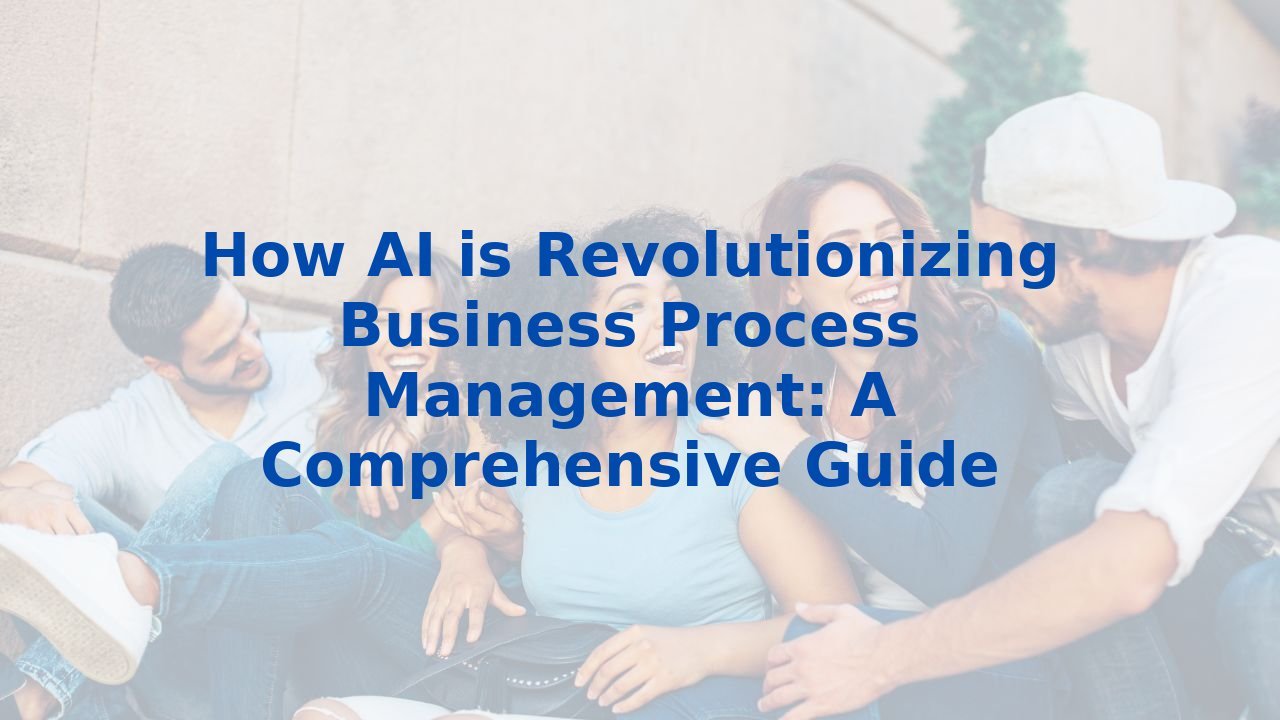How AI is Revolutionizing Business Process Management: A Comprehensive Guide
How AI is Revolutionizing Business Process Management: A Comprehensive Guide
Business Process Management (BPM) is the backbone of any organization, designed to optimize efficiency and productivity. As we stand on the cusp of a new era shaped by artificial intelligence (AI), the landscape of BPM is evolving. This transformation is not just about technology but about rethinking the very way we operate and make decisions. Let's dive into how AI is enhancing business processes and the deeper implications for organizations.
1. Process Discovery and Mapping
At the heart of BPM lies the need for clarity—knowing what processes drive your business and how to optimize them. AI brings advanced technologies such as process mining and natural language processing into play. These tools unveil existing workflows, spotlight inefficiencies, and create dynamic process maps that evolve with the business landscape. This foundational step lays the groundwork for improved operational models by pinpointing bottlenecks and redundancies.
2. Process Automation
Imagine shifting mundane tasks from the shoulders of your talented workforce to the efficiency of algorithms. AI empowers organizations to automate repetitive activities, minimizing human error and liberating time for strategic pursuits. Document processing becomes seamless, allowing teams to invest their cognitive resources in creativity and problem-solving instead of clerical labor.
3. Continuous Monitoring and Improvement
In a world where every millisecond counts, continuous monitoring is crucial. AI excels in this area, analyzing historical data to predict potential disruptions. This proactive approach catches minor deviations before they escalate into significant challenges. Insight-driven decisions stemming from real-time analysis foster an environment of agility, enabling ongoing process enhancement tailored to your organization’s needs.
4. Enhanced Decision-Making
Data is the new currency, and AI is the exchange mechanism. The predictive capabilities of AI equip organizations with insights that drive informed decision-making. By revealing patterns and simulating the financial outcomes of various strategies, businesses can align their pricing and operational tactics with organizational goals. Armed with these insights, decision-makers are less likely to second-guess their strategies, leading to greater confidence and success.
5. Customer Service Optimization
Your customer service can transform into a seamless experience through AI implementations. From chatbots that address queries to sentiment analysis of customer feedback, AI systems enhance customer interactions. By intelligently categorizing requests and ensuring prompt resolutions, businesses can elevate the customer journey, ensuring satisfaction and loyalty in an ever-competitive market.
6. HR and Recruitment
Hiring the right talent is fundamental to organizational success. AI revolutionizes HR processes by streamlining recruitment. Automation can streamline initial assessments, combine performance metrics, and evaluate market trends to prepare competitive offers. The result? A refined recruitment process that saves time and enhances talent acquisition without compromising quality.
7. Supply Chain Optimization
In a fast-paced market, supply chain efficiency is paramount. AI brings real-time analysis capabilities that transform data into actionable insights. By spotting anomalies in purchasing trends, organizations can pivot quickly to avoid issues like stockouts or overstocking. This adaptability cultivates resilience, positioning businesses for long-term sustainability.
The Benefits of Training Employees for AI
While the technology itself is revolutionary, the people behind it are paramount. Training employees to adeptly interact with AI tools amplifies the benefits of this technology. This training fosters:
- Enhanced Efficiency: Employees equipped with AI skills adapt swiftly to new systems, maximizing the potential of tools at their disposal.
- Improved Decision-Making: A solid understanding of AI-generated insights empowers individuals to make decisions that align with strategic objectives.
- Increased Productivity: By automating routine tasks, team members can focus more on high-value projects requiring critical and creative thinking.
- Better Adaptability: A workforce educated on AI is resilient to industry changes and innovations that arise with rapid technological developments.
Conclusion
The marriage of AI and Business Process Management is not merely a trend—it is a strategic partnership fostering operational excellence. Organizations embracing AI-driven solutions while investing in employee education set themselves apart in today's competitive landscape. With AI as an ally, businesses can navigate complexities with agility, drive long-term success, and redefine what operational efficiency truly means.
In conclusion, the journey toward integrating AI into BPM is not just about new tools; it’s about cultivating an evolved mindset that positions organizations to thrive. So let’s embrace the future, where AI and exceptional talent work hand in hand for unprecedented success.



